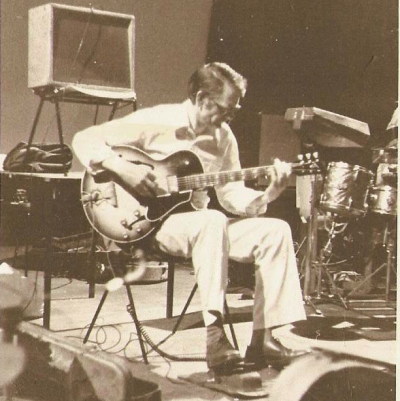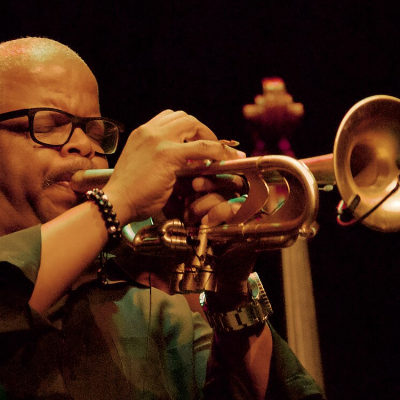.
.
“Stars” was a finalist in our recently concluded 65th Short Fiction Contest, and is published with the consent of the author.
.
.
___
.
.
photo of Derek Bailey via Wikipedia/CC BY-SA 3.0

.
Stars
by Ronald McGuire
.
…..He was the unlikeliest of rockstars. No producer believed in him, he didn’t look the part, tall and gangly, a mop of early-grey hair and a face that seldom smiled.
….. But when he played his guitar, people paid attention. It was a beautiful instrument, a ‘36 Martin D-45, acquired second hand at what was nevertheless an extraordinary price. He mortgaged his future against its strings, and in time he was rewarded for his regard of its beauty.
….. He had friends he believed in, and they believed in him. Together they formed a band, a band that changed everything. He wrote heartfelt ballads and soaring anthems. They toured the world until their name became household and their bonds became frayed.
….. The drummer lost his way in a forest of bad decisions, wasting his wealth on vices easy for a poor kid from the sticks to pick up when the money piled high.
….. The keyboardist lost interest; his voice was never heard. He knew how much better they could be if only they’d listen.
….. The bassist felt disposable. It ate at him until his soul digested his spirit and all that remained was jealousy and anger.
….. The rhythm guitarist, bored to indifference, wanted to burn it all down. He found beauty in destruction, the implosion of a high-rise.
….. On the eve of their last performance, the guitar, the rockstar’s talisman, went missing. He had other guitars, of course, but the Martin might as well have been his right hand. He’d put so much into it, had gotten so much from it, its absence filled his life with emptiness and anguish.
….. Accusations flew, threats were made, and the audience went home angry and unfulfilled. The keyboardist gave his ultimatum, the rhythm guitarist kept his silence, the drummer had a drink, and the bass player made a confession. The guitar was gone, he told them, destroyed in a fit of jealous rage.
….. They went their separate ways for years, and over time their animus grew as their songs faded. It didn’t take long in the grand scheme.
….. The rockstar found a kind of peace, laced with sorrow and regret, different from the life he thought he’d have, the antithesis of stardom.
….. He landed in a home near a cliff overlooking the northern sea, embraced by dark winters and cold isolation until he met his wife and started a family. He wrote music he thought would never be played, words never sung. Then, on a birthday like the others he didn’t celebrate, the boys in the band, seasoned by the years, arrived with an opportunity for forgiveness he could not ignore.
….. It was the drummer’s doing, long after sobriety had taken hold. He knew the bassist had lied all those years ago when he found the rockstar’s guitar in the window of a thrift shop. The instrument showed its age, mistreated by lesser musicians who knew nothing of its provenance, or its power. The bandmates arrived together at the cottage on the cliff, their gift wrapped in a simple cotton cloth.
….. Though it couldn’t be played, the rockstar wept when they handed him the instrument. He knew it was his the moment he touched it. He embraced the faded wood, missing frets, broken steel strings hanging down like tattered cobwebs in the corner of an ancient ruin. He clutched its neck like a long-lost lover.
….. The rockstar placed the beaten relic in a rack in the corner for safekeeping, walked back into his room made for music, his old friends following, and took a seat on a low stool. Instruments sat akimbo, longing for someone to bring order to their chaos, to make use of their ivory, wood and brass, strings of gut and steel. They settled in, and began to play.
….. They wrote nothing, made no recording, earned no money, acquired nothing material from their efforts, yet gained everything they were lacking. Their reunion expunged the reasons for their collective absence, revealing again the reason they’d come together in the first place. They’d found their way back to their brotherhood, a family once again.
….. Year after year after that day they gathered in the crowded room and played whatever they wanted, remembering all they’d done or failed to do.
…..Once they’d all passed from this life to the next, their children would do as they had done, gathering in the room, choosing the things they held most dear, making music for everyone and no one.
….. The old guitar, restored to its former glory, held in its place of honor, began again to fade away. The rockstar had kept it close at hand, to cradle and strum in those soft-lit hours at the end of life, then set it down one last time. Its luster faded, the depth of its meaning lost on the next generation.
….. Decades passed, then on a birthday celebrated like all the others, a great-grandchild of the rockstar spied the guitar in its corner, near forgotten. She was drawn to its aging beauty, compelled to touch it, at first gingerly, a light stroke of a single finger. A tone soft as velvet came forth, filling her senses. She caressed the fine twisted steel of its strings and heard another note that pleased her. She threw the strap over her shoulder, strummed a few chords, and sang a simple song, unaware generations of her family that lived in the music had come forward with the sound to witness her beginning.
….. Some would say she was likely to be a star, she looked the part.
….. She had a quick smile, a finespun voice, and a family history of music and love and overcoming. She grew to play guitar as a bird’s wings grow to play the air.
….. Before long, her friends, cousins of a sort, followed suit, each taking up an instrument to complement the other, and they formed a band.
….. A band that would change everything, not with stadiums filled with adoring fans, but with music and words filled with the power born of history and fate, love and forgiveness. The guitar carried her forward, elevated her artistry, and the spirits of the departed that dwelled in the music bore witness to it all, and waited with infinite patience for the next reunion.
.
.
___
.
.

Ronald McGuire is an author and journalist whose work has appeared in Winning Writers, The Dead Mule School of Southern Literature, Flash Fiction Magazine and Cinnabar Moth Literary Collections, among others. He holds degrees in Comparative Literature and Journalism from the University of Georgia. His first novel, Beyond Tomorrow’s Sun, will be published December 2024 by Cinnabar Moth Publishing. Find out more at ronaldmcguire.com.
.
___
.
.
Click here to help support the continuing publication of Jerry Jazz Musician, and to keep it ad and commercial-free (thank you!)
.
Click here to read “Ballad,” Lúcia Leão’s winning story in the 65th Jerry Jazz Musician Short Fiction Contest
Click here to read more short fiction published on Jerry Jazz Musician
Click here to read The Sunday Poem
Click here for information about how to submit your poetry or short fiction
Click here for details about the upcoming 67th Jerry Jazz Musician Short Fiction Contest
Click here to subscribe to the Jerry Jazz Musician quarterly newsletter (it’s free)
.
.
.
___
.
.
Jerry Jazz Musician…human produced (and AI-free) since 1999
.
.
.



































